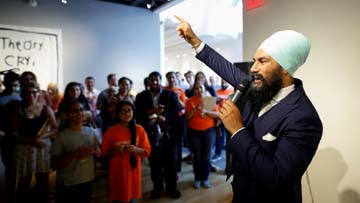

Within the space of a few moments, Jagmeet Singh became one of Canada’s most admired politicians. His cool-under-pressure reaction to being confronted by an angry heckler is just one of the reasons Singh won the leadership of the federal New Democratic Party last week.
A video of the Sept. 6 incident at Singh’s campaign event in Brampton, Ont., went viral and has been viewed millions of times in Canada and around the world. Moments into the event, an angry white woman interrupted Singh and shouted Islamophobic and vitriolic statements at him, and physically gesticulated, demonstrating her feeling of entitlement – to space, voice and position – in relation to others at the event.
Singh seemed undeterred by the outburst. His response to her rant was to rally his audience to help him relay his campaign message. He asked his guests to chant: “Love and courage.”
In the face of a racist rant, Singh remained calm.
What is the nature of Singh’s call for love? His political slogan is based on a message of universal love and courage. Singh’s message – and chant that evening – is uniquely situated among the slogans of the three other candidates: Charlie Angus “Got your back,” Niki Ashton “Building a movement, together,” and Guy Caron, “Let’s Build a Progressive and Sustainable Economy.”
The dramatic events at the Sept. 6 meeting demonstrates something about Singh, as a person and as a leader. It also points to new undercurrents of religion and spirituality and its role – not only in Canadian politics, but also in the leadership race for the NDP.
Singh’s outward appearance solicits questions from some Canadians – as in the case of the heckler – regarding his secular position: To what degree does Singh’s religion relate to his policy ideas or conduct?
Canadian political institutions and traditions are imbued with Judeo-Christian values and symbols. Yet the separation of church and state maintains religion does not dictate the making of policy and law.
However, in the game of politics, courting ethno-racial, national and religious identified voters has become a central art of party campaign strategists.
Political parties of all persuasions have had to navigate this division in a variety of ways. In Canada, the left social democratic tradition, represented now by the NDP, has had less experience with faith-based movements and the religious identity of its leaders than their right-wing counterparts and left-leaning parties elsewhere in the world. Singh’s leadership will likely change that.
Singh said his ability to remain cool under pressure was largely owed to his experience of being a brown, Sikh and turbaned man, growing up in the 1980s in Brampton, Ont., just northwest of Toronto.
His past experiences of religious and racist intolerance helped to fortify him against racist language and assault.
In the moment in which the racist woman yelled at him, she assumed he was a Muslim. Many wondered why Singh did not attempt to correct her misconceived perception; he is not a Muslim, but rather, a Sikh.
Suggesting such a distinction in the moment, he said, would only further the misunderstanding that somehow being Muslim means such treatment is considered justifiable. His reaction, he said, should not be to proclaim his religion. By not correcting this misconception, Singh was acting in solidarity against Islamophobia.
Sikhs have been affected throughout the post-9/11 discourses of Islamophobia, mainly because of a misunderstood identity.
While there are those who, in the similar vein as Singh, have sought to challenge Islamophobia by standing in solidarity, there have also been many instances where Sikhs in America, the U.K. and Canada painstakingly distinguish themselves from Muslims.
However, in countless examples, when Islamophobia is experienced in the public sphere against properly identified Muslims, there has been a lack of outcry.
The day-to-day effects of Islamophobia have led to many Muslims living with heightened experiences of fear and not knowing what they might encounter on a walk to school, a day at work or even waiting for a bus.
The issues of racism, religious intolerance and social justice are not central issues for any federal political party. These issues, however, should no longer be viewed as separate from major policy platforms including health, welfare reform, employment, national defense, national security, aboriginal relations and education. Perhaps a political leader such as Jagmeet Singh will be able to navigate these debates with an alacrity and style we have yet to witness in the Canadian political world.
Davina Bhandar is Adjunct Professor in School of Communication and Department of Gender, Sexuality and Women’s Studies, Simon Fraser University. Courtesy South Asian Post.
Davina Bhandar





